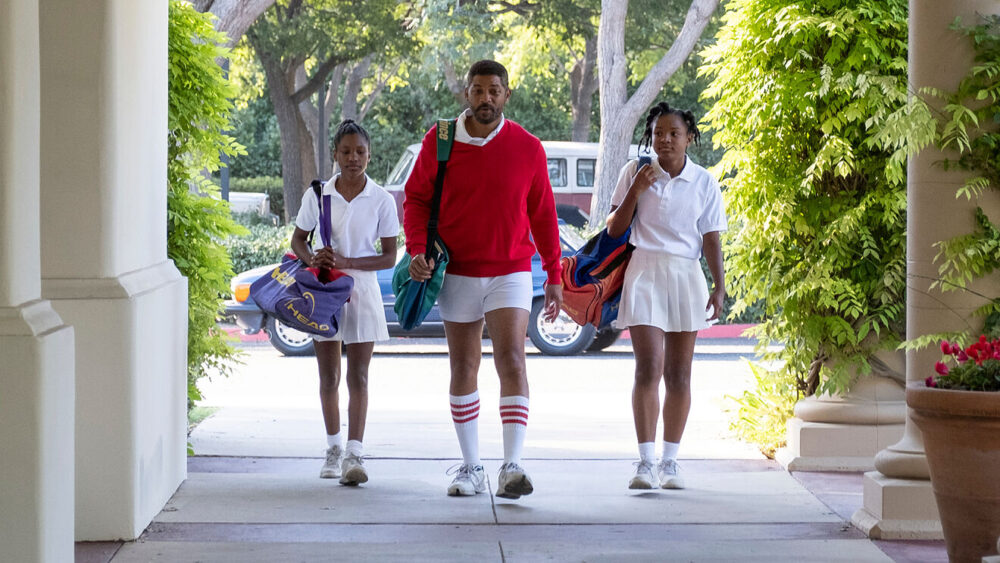As Reinaldo Marcus Green’s “King Richard” begins, we get a glimpse of a man named Richard Williams (Will Smith); who proceeds to explain that where he grew up, tennis wasn’t a game people played.
“We was too busy running from the Klan.”
It’s that tough childhood that molded this man and, complemented with his ever-inquisitive nature, allowed him to have a focused mindset to attain success at all costs. Such focus came to the fore in Williams’ interest in tennis—how it works, and how it is played. “That’s what I did with tennis. With the girls.”
In just under three minutes, this opening act reveals how Richard sought hard to find a professional coach for his daughters, to no avail. We also see Richard working as a security guard while coaching Venus and Serena every day, and he gets help from his wife Brandy (Aunjanue Ellis) who herself works as a nurse. “King Richard” quickly establishes the man as a tireless father who creates brochures and videotapes to advertise their skills; all of which he hopes could lure a pro to coach the girls and make them superstars.
But as it goes with sports biopics, the world isn’t too sunny for the protagonist—at least not just yet. “You’re making a mistake, but I’mma let you make it,” Richard tells a dismissive coach. Yet another one rejects him, saying that Richard wasn’t the first crazy parent to approach the coach with outlandish aspirations for their children.
Then again, as history unfolded, we now know who’s kicking themselves.

“King Richard” and How It Busts the Stereotype of the ‘Missing Black Father’
At this point, we feel for Richard and Brandy. Any parent would understand the everyday challenges of holding daytime jobs and parenting their children. In this case, both also serve as coaches to their daughters. In particular, we see Richard sign off on the trajectory of his daughters’ careers. From rigorous training sessions to controversially pulling both Venus and Serena out of the Junior Circuit (despite the former doing really well); Richard’s parenting style might come across as controlling and, worse, limiting.
Nonetheless, Richard reasons that his perseverance stems from his hopes that his kids enjoy a life off the streets. After all, the sisters are excelling as Black athletes in a predominantly White competition; and their Compton upbringing contrasts sharply to that of their upper-class competition. But to do so, he subjects the girls to almost-Draconian levels of parenting. At times, the film invites us to examine whether Richard himself has lost the grip on toeing the line that separates parenting and coaching.
Sure, history has been kind to the Williams family, and it seems to have validated the man’s arguably neurotic parenting. But the truth remains: had everything gone south, Richard Williams could have become the ultimate case study on ‘How NOT to Parent’.
A Film That Shows Tough-Love Parenting in All Its Jagged Edges
Despite the perceived hagiography of its subject, “King Richard” still manages to avoid completely lionizing its protagonist. While we witness a parent hell-bent on guiding his children toward success, the film also shows us how such obsession can have physical and emotional tolls on the girls.
In an early scene featuring Venus and Serena racing on who finishes first in delivering Yellow Pages in their neighborhood; a concerned neighbor tells the girls how she saw them training in the rain under Richard’s eye.
“You need to go tell your father to stop working you so hard…That man’s crazy.”
And that’s the main point of the film: “King Richard” shows parenting done doubly hard, which isn’t a new thing. What’s remarkable here, however, is that it shows a Black father doing everything in his power and knowledge to see his daughters become number one in the world.
As mentioned before, this perspective shatters the racial stereotype of absent fathers. But more importantly, it emphasizes a strict parenting that—while born out of love—can be counterproductive in the end owing to its obsessive nature.
Casting (Read: Will Smith) Makes a World of Difference for “King Richard” to Work
In several interviews promoting “King Richard,” Smith has said that his own father served as inspiration in his portrayal of Richard Williams. And while he notes that his father wasn’t perfect with parenting, Smith concedes that his father did what he did for Smith’s betterment.
And without further ado: Will Smith deserves all the nominations for best actor in this role.
Thanks to the filmmakers (the script having written by Zach Baylin), Smith gives his all in the film. And just like his work in “The Pursuit of Happyness” in which he plays a loving single father ready to shield his son from the harsh realities of the world; Smith channels his own upbringing for “King Richard.” Supporting him in the film are Aunjanue Ellis as Brandy; and Saniyya Sidney and Demi Singleton as Venus and Serena, respectively. All these give powerful screen time (with Ellis having a great chance of winning the ‘Best Supporting Actress’ categories); allowing the movie to be a family-friendly fare despite the heavy themes it tries to tackle.
Anchored by Will Smith’s towering performance, “King Richard” overcomes its sanitized characterization of an exacting man to present a closer look into tough-love parenting.
The result, all puns intended, is a grand slam.
“King Richard” is available to watch in theaters or stream on HBO Max.